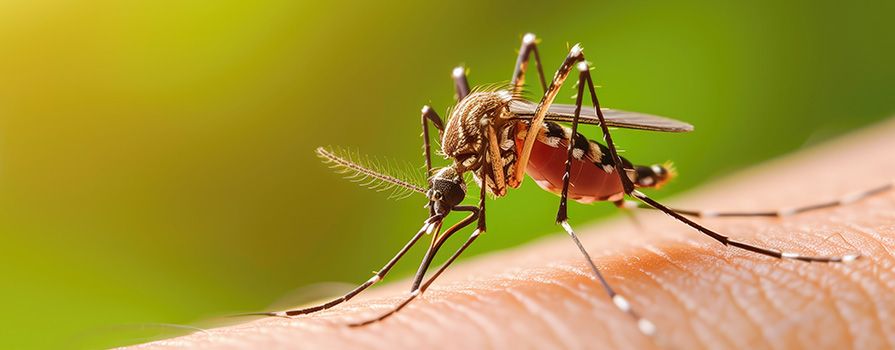
read time: 2 min
Health & Wellness
Remember the Zika virus outbreak in 2016? Well, another mosquito-borne illness is now dominating the news—dengue. Where can it be found, why is it such a threat, and what other mosquito-borne illnesses are cause for concern?
Dengue: The latest mosquito-borne outbreak
In June 2024, a growing risk of dengue virus infections prompted the Centers for Disease Control and Prevention (CDC) to issue a Health Alert Network (HAN) Health Advisory. In addition, public health authorities in Puerto Rico declared a public health emergency in March 2024.
Countries throughout the Americas have reported a record-breaking 9.7 million cases of dengue virus infections in the first 6 months of 2024, which is twice as many cases compared to the same time period in 2023.1
Closer to home, more than 2,600 cases (as of July 17, 2024) were reported across 45 US states and territories, with the majority of cases occurring in Puerto Rico and among US travelers. Specifically, California, Florida, Massachusetts, New Jersey, and New York are experiencing large numbers of cases.2
How dengue spreads
Dengue is caused by 4 related dengue viruses—DENV-1, -2, -3, and -4. It is spread to humans by bites from the Aedes species of mosquito.1 Because it’s transmitted to humans by animals, it’s considered a zoonotic disease.
Dengue symptoms and severity
If you’ve been infected with dengue, you may notice some of the following symptoms within 2 weeks:
- Fever
- Muscle, joint, and bone aches
- Pain behind the eyes
- Headache
- Nausea
- Rash
Most people feel better within a week. But pay close attention to how you’re feeling in the 24 to 48 hours after your fever goes away. That’s when you’re most at risk for severe dengue. Dangerous symptoms—excessive vomiting, bleeding from the gums or nose, blood in your vomit or stool, or feeling tired and irritable—require emergency care.3
If you suspect you have dengue or were exposed to it, contact your doctor immediately. They will likely review your recent travel history and order a blood test that can diagnose dengue.
Why are dengue outbreaks happening now?
The capacity for mosquito-borne illnesses to spread is significant thanks to a greater prevalence of mosquitoes. The CDC notes that increasing global temperatures can expand the range of the Aedes species of mosquitoes that spread dengue.1
Another contributing factor to the current rise in dengue cases is that the summer travel season coincides with heavy mosquito seasons in many countries. That’s why the precautions in the CDC Health Advisory include protecting yourself from mosquito bites if you’re traveling internationally to an area with frequent dengue transmission.1
Other concerning mosquito-borne illness
Recent news about the transmission of dengue calls to mind the not-so-distant outbreak of Zika virus from 2015 to 2017 and the concerns around West Nile disease that started in the early 2000s.
About Zika virus
Zika virus is a mosquito-borne illness that can also be transmitted through sexual contact or during pregnancy. Its link to pregnancy complications and birth defects grabbed headlines in 2016. It remains a potential risk in many parts of the world, such as Africa, the Caribbean, Central America, South America, Southeast Asia, and the Pacific islands. The most common species of mosquito known to transmit the Zika virus, Aedes aegypti, can be found in the US. But as of May 2024, no cases of Zika were reported in the country this year, and it is not currently considered a health threat.4
About West Nile virus
Another common mosquito-borne illness is West Nile virus. Most people who get infected don’t show any symptoms, but a small number may develop serious neurological problems like encephalitis or meningitis. A major outbreak in the US in 2002 led to 284 deaths.5 Today, the CDC considers West Nile an ongoing, fluctuating health concern. As recently as 2021, a large outbreak of more than 1,600 cases occurred in Arizona.6 However, in the first 6 months of 2024, only 25 cases across 14 states were reported in the US.7
Testing options for dengue, Zika, and West Nile
Testing for infectious diseases like dengue, Zika, and West Nile is readily available in the US.
- Dengue: Blood tests to diagnose dengue are recommended within 7 days of experiencing symptoms
- Zika: Blood or urine tests can diagnose Zika within 2 weeks of symptoms starting. At the peak of the Zika health emergency in 2016, Quest was the first commercial lab to receive Emergency Use Authorization (EUA) from the U.S. Food and Drug Administration for a molecular test for the Zika virus8
- West Nile: Antibody blood tests are typically performed within 3 to 8 days after West Nile symptom onset. A spinal fluid test can also be used to diagnose the virus
Check with your doctor to be tested if you suspect you were exposed to any of these viruses.
References:
- Centers for Disease Control and Prevention. Increased risk of dengue virus infections in the United States. Published June 25, 2024. Accessed July 19, 2024. https://emergency.cdc.gov/han/2024/han00511.asp
- Centers for Disease Control and Prevention. Dengue, current year data (2024). Updated August 7, 2024. Accessed August 13, 2024. https://www.cdc.gov/dengue/data-research/facts-stats/current-data.html
- Centers for Disease Control and Prevention. Symptoms of dengue and testing. Published May 14, 2024. Accessed July 19, 2024. https://www.cdc.gov/dengue/signs-symptoms/index.html
- Centers for Disease Control and Prevention. Countries and territories at risk for Zika. Published June 27, 2024. Accessed July 19, 2024. https://www.cdc.gov/zika/geo/index.html
- Centers for Disease Control and Prevention. Provisional surveillance summary of the West Nile virus epidemic—United States, January-November 2002. MMWR Morb Mortal Wkly Rep. PMID: 12537287
- Holcomb K. Worst-ever U.S. West Nile virus outbreak potentially linked to a wetter-than-average 2021 Southwest monsoon. NOAA. Published July 21, 2022. Accessed July 19, 2024. https://www.climate.gov/news-features/features/worst-ever-us-west-nile-virus-outbreak-potentially-linked-wetter-average
- Centers for Disease Control and Prevention. West Nile virus, current year data (2024). Updated July 16, 2024. Accessed July 19, 2024. https://www.cdc.gov/west-nile-virus/data-maps/current-year-data.html
- Quest Diagnostics. Zika test from Quest Diagnostics authorized by the FDA for emergency use. Published April 28, 2016. Accessed July 19, 2024. https://newsroom.questdiagnostics.com/2016-04-28-Zika-Test-from-Quest-Diagnostics-Authorized-by-the-FDA-for-Emergency-Use









